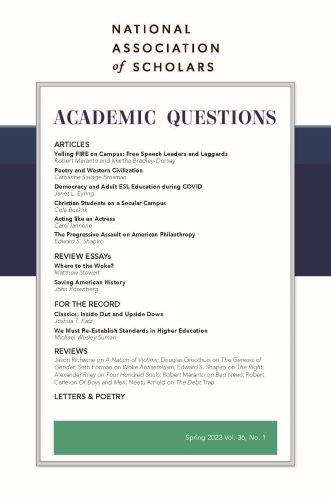Woke Antisemitism: How a Progressive Ideology Harms Jews, David L. Bernstein, Foreword by Natan Sharansky, Post Hill Press (imprint Wicked Son Books), pp. 224, $18.00 paperback.
Seth Forman is managing editor of Academic Questions and author of Blacks in the Jewish Mind: A Crisis of Liberalism (NYU Press, 1998).
David L. Bernstein has written a searing and unflinching memoir about woke progressivism’s capture of American institutions, specifically the Jewish ones in which he has held leadership positions. Though not a work of fiction, the book is something of a bildungsroman in which Bernstein documents his growing awareness of woke ideology, it’s insidious antisemitism, and the devastating effect it has had on his own life as a “liberal humanist who strongly supports the free exchange of ideas.” The ramifications of woke ascendance have been perhaps more traumatic for Bernstein as someone for whom free expression—or “Makhloket l’shem shamayim (“arguments for the sake of heaven”) (34)—is central to his Jewish identity.
By progressive woke ideology, Bernstein means specifically the outgrowth of postmodernist thought that holds three core tenets: one, there is only one cause of all group disparities: discrimination by the powerful against the powerless; two, bias and oppression are not just matters of individual attitude but are embedded in the structure of society; and three, knowledge comes only from the place one holds in the racial hierarchy. Thus, nothing those with power say is untainted by their malevolent will to keep it. Even liberalism’s support of free speech, in this conception, is an affront to “social justice.”
Bernstein is not the first liberal to point all of this out. The closest recent attempt to draw attention to woke’s dangers is John McWhorter’s Woke Racism (2021), on whose title Bernstein piggybacks. But Bernstein’s account is infused with a particular gravitas. It is personal, which intensifies his narrative, and Bernstein has skin in the game. Like former New York Times columnist Bari Weiss, he has left a high-profile position in a powerful organization to fight in defense of liberal principles, losing professional contacts and publishing opportunities in the process.
While the woke racial hierarchy includes many identity groups, Bernstein explains that in effect it is binary, with whites the transgressors and non-whites the aggrieved. So while Asian success has recently come into view as a challenge to this white/non-white binary, the Jews in some ways pose a unique problem. With the Nazi Holocaust still within living memory, Jews stand out in the public conscience as having a strong claim to historical victimization. Yet the success of Zionism in establishing a nation-state and the attainment of a near universal middle-class among Jews in the West stands in stark contrast to the helpless lack of agency wokeism ascribes to victim groups. The woke, therefore, deconstruct Jewish history so that Jews are seen as not only white and privileged, but the most privileged of all whites: Jews didn’t just own slaves, they ran the slave trade; Jews didn’t just contribute to white racism, they invented black stereotypes in Hollywood movies. Thus, the antisemitic fliers that made their way onto the University of Illinois at Chicago campus in 2017 that read, “Ending white privilege starts with ending Jewish privilege.”
Bernstein is deeply hurt by this, and a sense of betrayal and loss permeates the book; betrayal by his liberal associates, and the loss for Bernstein, and presumably other liberal Jews, of what they believe is their hard-earned place on the side of the disadvantaged.
Skillfully weaving his personal experiences into the warp and woof of political events, Bernstein begins his story with his 1970s boyhood in a liberal Ohio household, where he and his dad supported the right of American Nazis to march through heavily Jewish Skokie, Illinois and where every liberal Bernstein knew was a “classical” liberal: “They felt as strongly about one’s right to be wrong as they did that one could be very, very wrong.” (18)
At Ohio State in the early 1990s, Bernstein noticed classical liberalism was losing ground to radical ideologies. But the key event for Bernstein came with the 2001 World Conference against Racism, Racial Discrimination, Xenophobia and Related Intolerance in Durban, South Africa, which he viewed from his perch as the Washington Regional Director of the American Jewish Committee. Here an international conference charged with reducing prejudice quickly devolved into an anti-Jewish, anti-Israel hate fest, prompting both Israel and the United States to pull their delegations. The Durban debacle, Bernstein writes, was made possible only by the widespread acceptance of postcolonial theory, a rigid precursor to wokeism that proffers only one explanation for why countries were rich or poor. “the haves caused the deprivations of the have-nots—full stop.” (42)
This ideology seemed to Bernstein very much like a new type of “coercive diversity” invading the civil rights and Jewish groups he was involved with. At various inter-agency training programs and colloquia Bernstein learned that “racism equals prejudice plus power,” a formula he understood as absolving non-white groups of wrongdoing, and that whites enjoyed advantages over blacks that were invisible to whites, a clearly “dogmatic formulation of social advantage.”
A complete woke victory, however, was achieved only when a new cohort of young staffers came barreling into Jewish organizations. As head of the David Project, an organization dedicated to training college students to advocate for Israel, Bernstein noticed a remarkable shift in students’ beliefs. By 2014, the year Michael Brown was shot in Ferguson, Missouri and two years after the rise of Black Lives Matter (BLM), students had stopped peddling the “soft-postmodernism” that saw all viewpoints as equally valid. Now they peddled a “hard-postmodernism” of binary power structures “that expressed in no uncertain terms who had power and who was powerless.” (63) And they weren’t quiet about it.
At a retreat Bernstein organized, a David Project campus professional disrupted training activities by insisting, “We do really need to acknowledge our privilege . . . we shouldn’t really do this work unless we gain their [blacks’] approval.” (62)
As head of the influential Jewish Council for Public Affairs (JCPA) from 2016 to 2021, Bernstein watched as offsite retreats, interagency meetings, and Zoom calls were continually disrupted by young staff members steeled with the certainty of their views on power and privilege. “In retrospect,” writes Bernstein, “I now see how organizations . . . through repeated capitulation, can be captured by young ideologues.” (68)
The final straw came after George Floyd’s killing in 2020 when the progressive Jewish group, Bend the Arc, circulated an open letter of unqualified support for BLM. Despite his opposition to the BLM rioters’ demands to “Defund the Police” and violent attacks on police buildings, Bernstein was either unable or unwilling—"I couldn’t tell which”—to deviate from the progressive party line and signed the letter.
He had become a “doublethinker,” an Orwellian term deployed by Jewish “Refusenik” Natan Sharansky on behalf of Russian Jews forced to spout lies for the same Kremlin that held them captive. “Did I really believe it was in the Jewish community’s interest to place so much emphasis on engaging progressive ideologues? No, I did not.” (92)
In February of 2021, Bernstein resigned from the JCPA and shortly after founded the Jewish Institute for Liberal Values (JILV), a nonprofit dedicated to supporting free thought and expression and countering woke ideology in the Jewish community.
Given the compelling evidence in this book, it is hard not to root for Bernstein. His captivating narrative manages to turn dense and evasive social justice theory and the politics of nonprofit management into a remarkably erudite and moving human story.
Yet the liberalism Bernstein so badly wants to restore may be a spent political force. Ever since Lyndon Johnson made his 1965 speech indicating that it was not enough to liberate blacks through “equality of opportunity,” but that the goal must be “equality as a result,” liberalism has staked its claim to power on the woke assumption of universal black disadvantage. This was modern liberalism’s “original sin,” a betrayal of color-blind equal rights that cemented the woke racial binary, through affirmative action and “disparate impact,” in American custom and law. Racial preferences are the triumph of the woke belief that all blacks share the same soul-crushing experience, and all whites benefit from racial advantage.
Bernstein wants to restore the primacy of equal treatment, but he also operates well within the model of diversity that inevitably champions minority privilege. He calls the diversity he favors “patriotic pluralism” which means “essentially enlisting a diverse array of ethnicities and cultures in forming a single nation.” (51)
But if all cultures are equal contributors to a national culture, America’s core Anglo-Protestant culture—the one that bequeathed to us free speech and equality of all persons—not only loses its central place but becomes suspect for its dominance. As identity groups clamor for recognition against the assimilative power of individual rights, they are inescapably drawn to the woke conceit that America’s core culture is merely another narrow parochial interest—“whiteness.” Opposition to whiteness and its ideals of self-reliance, individual merit, and free speech provides the unifying energy for minority group activism, a set of cultural benchmarks and assumptions from which identity groups can distance themselves.
This distancing strategy is seen nowhere more clearly than in Bernstein’s fear that being labelled “white” threatens the Jews’ corporeal existence, that whiteness “is no way to imbue fealty to Judaism and the Jewish people in the next generation.” (170)
As he rails against woke’s rigid racial categories Bernstein seems at least as concerned that Jews get slotted into the correct one. By 2016 Bernstein “came to believe that the mainstream Jewish community needed to find a way to include the Jewish narrative in the intersectional matrix . . . Jews needed to be viewed as one of the oppressed groups.” (66)
This is the principal reason that Bernstein opposed California’s Ethnic Studies Model Curriculum (ESMC), adopted in 2021. The ESMC needed to be rejected not only because it “divides the world into oppressor and oppressed, teaches opinion as fact,” Bernstein writes, but also because of “its implicit omission of Jews as an oppressed group.” (160)
Of course, Bernstein is right that woke’s portrayal of Jews as white oppressors denigrates and erases “the unique qualities endowed by our heritage,” to say nothing of Jews’ sometimes unique vulnerability. But how does he propose to reconcile his rejection of whiteness with a benevolent view of America’s core culture, upon which rests the free speech and sense of fair play he so earnestly seeks? If even Jews haven’t been given a fair shake, how can America’s stated commitment to equality, moral autonomy, and individual liberty be seen as anything other than compromised and corrupt?
Liberalism and civil rights activism was, in effect, an accommodation secular Jews made with American life, a way to shed their ethnicity and, without reverting to religious orthodoxy, still signify they were culturally different from the American mainstream. But this mode of cultural distinctiveness vanished the moment equal rights became mainstream, and liberalism moved from integration to diversity. At that moment, American liberalism ceased being a guarantor of Jewish acceptance and difference, of Jewish safety and advance.
The discovery that American liberalism may not be completely consonant with Jewish flourishing has been traumatic for Jews who, like Bernstein, lament that being labelled white deprives Jews of the ability “to take pride in the prominent role the Jewish community played in the Civil Rights era.” (171) But this anguish has less to do with Jews’ racial status than it does with having recklessly joined Jewish meaning to the precarious uncertainty of political ideology.
Photo by Taylor Brandon on Unsplash













